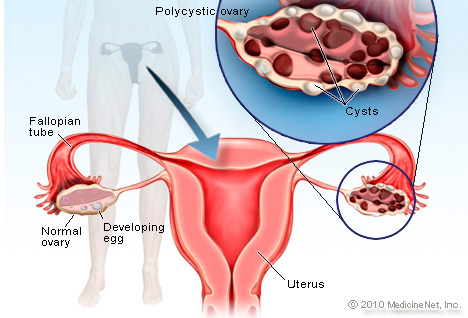Are you suffering from polycystic ovarian syndrome and are looking for an ideal remedy? Polycystic ovarian disease or PCOD is a common female health condition. It is a complex disorder and involves several factors which include insulin resistance, obesity, irregular menstrual bleeding, insufficient ovum production, and abnormal menstrual cycles. PCOD commonly occurs during the reproductive age of a woman and accounts for being a major cause of infertility.
According to Ayurvedic principles, PCOD occurs primarily due to the imbalance state of your doshas. The dosha vaishanmya is linked to the symptoms of PCOD, and the relationship between the doshas and lakshans is permanent.
POLYCYSTIC OVARIAN SYNDROME (PCOS) AND HAIR LOSS
PCOS can cause hyperandrogenism – where your body produces too many androgens (male hormones). Androgens are naturally found in all women. They affect the degree and frequency of bleeding during your menstrual cycle and can also cause acne and oily skin. However, if your hair follicles are sensitive to androgens they can also decrease the growth of hair on your scalp and increase the growth of hair on your body. This is especially true if you have excessive amounts.
Follicle sensitivity is not simply ‘caught’ or randomly acquired. It’s genetically inherited and has been there since birth. If you have little or no hair follicle sensitivity, your hair may not be very affected by extra androgens. But normal or even sub-normal amounts of circulating androgens can cause hair loss if your follicles are very sensitive to them.
Treatment
PCOD is associated with stri beeja and rajah formation, along with medhodhantu to some extent. These should be attended to while the condition is being treated. The Ayurvedic treatment of PCOD aims at providing ideal care by correction of the ama dosha. By this, you achieve koshta shuddi, which in turn regularizes your tridoshas. The way or approach towards Ayurvedic treatment for PCOD includes the following:
Treatment of agnimandya at both dhatwagni and jataragni levels.
The alleviation of sroto avarodha is an essential part of PCOD treatment using Ayurveda. You should undertake purificatory therapies which are based on the grade of your doshic vitialation, and the exact area of affliction. These should be followed by rasayana drugs, which are free radical scavenging agents.
The regularization of the apana Vata is essential as well. You must firmly avoid vihara and kaphkara ahara.
Yoga and meditation are very important for the Ayurvedic treatment of PCOD. You should perform yoga asanas regularly. Some of the ideal postures for PCOD management include sarvangasana, matyasana, and shavasana.
It is also very important for you to work out regularly, undertake different physical exercises. This will make your overall life much healthier.
You must follow a healthy, balanced diet regularly, which should consist of fresh vegetables and fruits.
Ayurvedic herbs for the treatment of PCOD
The varuna crataeva nurvala is an effective herb which helps in the clearance of channels, which reduces your cyst’s size.
You can try hareetaki because of its amazing laxative effects, which reduce the morbidity of your body.
Bilva or aegle marmelos heps in reducing the size of your growth, via its digestive effect.
Strotasshuddhi is required and herbs likes Punarnava, kaphhar medicines are advised.
Phytooestrogen sources and female tonic Shatavari is very much advised.
Agnimantha, similar to lions. Lake er dhareyjata
Guduchi is another effective remedy for PCOD and has a rejuvenating effect.
Kanchnar is the drug of choice for Thyroid as per AYURVEDA, Strotasshuddhi is done by using Trikatu, Punarnava and other medicines. Rasayan like Shatavari are advised for enhancing female hormones.
If you are experiencing any symptom of PCOD, it is recommended for you to visit an Ayurvedic practitioner. This ensures that proper diagnosis is undertaken so that you can start treating the condition as early as possible.
PCOS (Polycystic Ovarian Syndrome) is a common disorder that can be seen to be mainly affecting women of reproductive age. As the name indicates, PCOS results in the formation of a cyst(s) in either one or both the ovaries. The presence of cysts in the ovary wrecks havoc affecting the ovulation process to a great extent. As a result of PCOS, the eggs do not undergo maturation. A situation may also arise whereby, the eggs mature but the ovary does not release them.
In PCOS, there is an elevated production of the hormone Androgen (often referred to as male hormones). The higher the androgen level in females the more the complications including obesity, infertility, irregular periods, heart ailments, hypertension as well as diabetes and insulin resistance. Hirsutism (excessive presence of body hair, especially on the face, chin or chest), alopecia or acne problems are also commonly observed. Thus, the condition should be treated and managed at the earliest. Conventional treatments though available may not always produce the desired results. Of late, Ayurveda has been making a lot of noise for all the right reasons. In fact, a lot of women have been successfully treated for PCOS and the associated symptoms, all thanks to Ayurveda.
Ayurveda that has been in practice since the ancient times believes that a healthy body is one where there is a perfect balance between the various energies or doshas. As per Ayurvedic scriptures, there are three main doshas - Vata dosha (wind energy), Kapha dosha (water energy) and Pitta dosha (fire energy). A disruption of the equilibrium between the Vata, Kapha, and Pitta dosha is what triggers a diseased condition in a person.
PCOS is a problem resulting from the Kapha Dosha. According to Ayurveda, there are seven Dhatus (tissues) in our body. Some of the Dhatus affected by PCOS include Artava Dhatu (Female reproductive organ), Rasa Dhatu (plasma and lymph) and the Meda Dhatu or the adipose tissue.
The Ayurvedic approach to treat PCOS involves restoring the balance between the three doshas.
The use of herbs such as Ashwagandha, Dandelion, Blue cohosh, Tulsi, Neem, Fenugreek, Castor oil, Sesame seeds, Flax seeds, goes a long way to treat the hormonal imbalance along with the associated symptoms of PCOS (infertility, diabetes, to name a few).
In addition to the use of herbs, there are few pranayamas which work wonders in the case of PCOS by relaxing the whole body and restoring the balance between the doshas.
Women with PCOS benefit immensely from Panchakarma.
It is an Ayurvedic treatment that involves, oil massages, oil baths (Oleation), Fomentation (a process where the body undergoes intense sweating) to eliminate the toxins out of the body (detoxification) that may trigger the various disorders.
Avoid foods with a high glycemic index. Instead, opt for foods such as grapefruits, cauliflower, peaches, onion, apples and other similar dietary options that have a low glycemic index.
Severely obese patients should make an effort to shed the extra kilos.

According to the All India Institute of Medical Sciences, 1 in 4 women suffer from the endocrine system disorder known as Polycystic Ovary Syndrome (PCOS). Although the ailment is extremely common, what is alarming is the fact that there is very little awareness about it; with over 50% of women being are unaware that they are suffering from this disorder.
With symptoms like irregular and painful periods, rapid weight gain, thinning and growth of hair on the face and body, PCOS often leads to self-esteem issues. And if it goes unchecked, it can contribute to long-term health problems like infertility, diabetes, heart disease and endometrial cancer as well.
While the diagnosis of PCOS may mean a lifetime of reproductive issues for many, what a lot of women do not know is that it can be treated with homeopathy and that they can lead a PCOS-free, healthy and normal life.
Commenting on the World PCOS awareness month, Dr. Mukesh Batra, Padma Shri recipient and Founder & Chairman Emeritus, Dr Batra’s Group of Companies, said, “Women are the backbone of healthcare in any society. However, often they ignore their own health. For a nation to be healthy, it is important that its women are healthy. In my 44 years of practice, I have seen more and more women presenting with symptoms of PCOS. Homeopathy offers safe, proven and cost-effective treatment methods.”

PCOS or PCOD is common problem with females. Cystic ovaries cause irregular menses or no menses. In women, PCOS can be the cause of infertility. In severe cases it also causes hirsutism(excess hair on chin),weight gain.
YES, PCOS is curable with Homeopathy.
When it comes to alternative systems or complementary treatments for PCOS, Homeopathy offers the best alternative. This is because Homeopathy focuses on treating and curing the root cause of the problem. The Homeopathic philosophy of disease is not based on the external causes of diseases.It is only when the immunity or its own internal vitality is deranged that the body becomes incapable of keeping itself disease free. Therefore Homeopathy tries to restore the balance of that vitality. Once the vitality regains its original balance, it is able to nurse itself back to health without any external aid of hormones.

Polycystic Ovary Syndrome (PCOS) is one of the most common conditions that affect women in more ways than one. It is a hormonal disorder that may cause infrequent or prolonged menstrual periods. Moreover, in this case PCOS may cause excessive hair growth on the face and body or baldness and this condition can contribute to long term health problems like diabetes and heart diseases. We take you through PCOS, its causes, symptoms and the foods you must eat to reduce the effects of this condition.
What is PCOS?
Polycystic Ovary Syndrome (PCOS) is a health condition in women where cysts get formed in the ovaries, caused by an over-production of hormones known as androgens. This causes women to suffer from various health problems and as per the PCOS Awareness Association, there is no cure for this health condition yet, but there are many ways to decrease or eliminate PCOS symptoms. Some of the biggest health problems that are associated with PCOS are heart diseases, diabetes, high cholesterol, high blood pressure and even stroke.
PCOS Causes
The PCOS cause is not yet understood completely, but most health experts associate it with genetics that can be one of the factors. PCOS can run in to your family and chances are higher in case of women who have irregular periods or diabetes.
Ideally, ovaries tend to make a small amount of male sex hormones called androgens; however, in case of PCOS, the ovaries start to make more of them that may cause you to stop ovulating as a result due to which you may get acne and grow extra facial hair on the face and body.
What are PCOS Symptoms?
PCOS symptoms can vary from person to person and how severe the case is. Some of the PCOS symptoms may include-
Acne
Extra hair on the body and face. In some cases, hair can be thicker and darker as compared to normal human body.
Thinning hair on the scalp.
Weight gain and excessive trouble in losing weight. Women with PCOS tend to gain weight easily as they have higher than normal level of insulin, a hormone that is produced in your pancreas that helps the cells in your body turn sugar into energy.
One of the PCOS symptoms may include fertility problems.
Irregular or no periods may also be one of the many PCOS symptoms. In some cases, many may have very heavy bleeding.
These PCOS symptoms may cause a person to fall into depression.
PCOS Diet: What foods should you have?
According to Neha Shetty, Senior Nutritionist, Reduce - Talwalkar's, "PCOS diet should be such that it helps reduce weight and positively affects hormones and improves insulin resistance. A moderate intake of complex carbohydrates, high protein and fair intake of healthy fats is advisable. Consuming sufficient amount of omega-3 fats should also help women with PCOS." In order to combat the many symptoms of PCOS, it is important to focus on a healthy diet. Here's what your PCOS diet should look like.
1. Load Up On Fibre
Women with PCOS have higher insulin levels, but eventually become insulin resistant, meaning you aren't able to use the produced insulin effectively. In order to produce productive insulin levels, it is important to load up on fibrous foods. High fibre foods like whole grains, cruciferous vegetables, beans, lentils, broccoli, legumes, nuts and seeds help fight insulin resistance by slowing down digestion and reducing the impact of sugar on the blood.
2. Consume More Lean Protein
PCOS can cause you to gain weight. Eat more lean protein as they are more likely to keep you fuller for longer and prevent you from reaching for unhealthy snacks. This way, you won't be adding up to calories and not gain weight. Your PCOS diet should consist of tofu, chicken and fish.
3. Eat Foods That Reduce Inflammation
One of the PCOS causes may also include inflammation that is responsible for creating an imbalance in the hormones. According to the PCOS Nutrition Center, eating foods that helps reduce inflammation can minimize PCOS symptoms. Load up on tomatoes, kale, spinach, almonds, walnuts, olive oil, fruits, fatty fish and whole grains that have anti-inflammatory properties.
4. Load Up On Omega-3 Fatty Acids
Omega-3 fatty acids are known to balance hormones and also improve insulin levels. Consume foods like fish, olive oil, avocado and nuts and seeds.
5. Take A Low Glycemic Diet
Your PCOS diet should have low glycemic index; women with PCOS are generally insulin resistant causing the insulin levels and blood sugar levels to rise unnaturally. In that case, loading up on low glycemic foods like fruits and vegetables, whole grains, lean protein and healthy fats can help reduce many symptoms of PCOS.
PCOS Diet: Foods to avoid with PCOS
According to Nutritionist Neha, there are various foods that can make your condition worse than ever. Some of the foods to avoid with PCOS may include-
1. Processed foods
Processed foods have high sodium content and may contain unhealthy fats that may only worsen your case. Make sure you limit the amount of processed foods like junk food, canned products, fried foods, et al.
2. Milk
Milk has the tendency to increase the testosterone levels; thanks to its high protein content that limits the normal testosterone metabolism. High testosterone levels can worsen your situation, so prefer having skimmed milk than full-fat.
3. Simple and refined carbohydrates
Women with PCOS are at a higher risk of developing diabetes and gaining weight. Sugary foods and refined flours end up increasing the blood sugar level.
4. Soy and fat
Soy products generally cause delay in ovulation and if you are trying to conceive, there may be a chance that your consumption of soy may be affecting it.
5. Caffeine and alcohol
Caffeine and alcohol have long been associated with infertility, which may worsen the case in women with PCOS.
PCOS weight loss
Losing weight is a gradual process, but in case of PCOS, it may take even longer as your body is already dealing with many hormonal imbalances. PCOS weight loss regime should be followed in a discipline to see effective results. It is important to eat the right diet, exercise well and ensure taking medications routinely. Regular exercises may help a lot by improving insulin resistance and ovulation and further help burn fat.
PCOS can be a stressful condition; however, you can reduce its symptoms and ensure a healthy and balanced life. Make sure you consult a doctor or nutritionist before switching to any diet plan.












